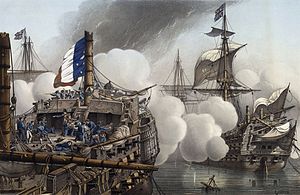HMS Majestic was a 74-gun third-rate ship of the line launched on 11 December 1785 at Deptford.[1]
 Tonnant at the Battle of the Nile, by Louis Lebreton. HMS Majestic is seen in the background.
| |
| History | |
|---|---|
| Name | HMS Majestic |
| Ordered | 23 August 1781 |
| Builder | Adams & Barnard, Deptford |
| Laid down | June 1782 |
| Launched | 11 December 1785 |
| Honours and awards |
|
| Fate | Broken up, April 1816 |
| General characteristics [1] | |
| Class and type | Canada-class ship of the line |
| Tons burthen | 1623 (bm) |
| Length | 170 ft (52 m) (gundeck) |
| Beam | 46 ft 9 in (14.25 m) |
| Depth of hold | 20 ft 6 in (6.25 m) |
| Propulsion | Sails |
| Sail plan | Full-rigged ship |
| Armament |
|
Background
editMajestic fought at the 1798 Battle of the Nile, where she engaged the French ships Tonnant and Heureux, helping to force their surrenders. She was captained by George Blagdon Westcott, who was killed in the battle.[2]
On 22 February 1799, Majestic was in sight when Espoir, under the command of Captain James Sanders, captured the Spanish 14-gun xebec Africa some three leagues (14 km) from Marbello on the Spanish coast. Captain Cuthbert, of Majestic, transmitted Sanders's letter, adding his own endorsement extolling "the meritorious Conduct of Captain Sanders and his Ship's Company on the Occasion."[3] Espoir and Majestic shared the prize money for the xebec, whose full name was Nostra Senora de Africa.[4]
On 4 April, Majestic and Transfer destroyed a French privateer of unknown name. Head money was paid in 1828, almost 30 years later.[Note 1]
On 11 November 1804, Glatton, together with Eagle, Majestic, Princess of Orange, Raisonable, Africiane, Inspector, Beaver, and the hired armed vessels Swift and Agnes, shared in the capture of Upstalsboom, H.L. De Haase, Master.[Note 2]
On 4 September 1807, Majestic, flagship of Admiral Thomas Macnamara Russell anchored off Heligoland, effecting the capitulation of the island to the British.[7]
Majestic was razeed into a 58-gun fourth-rate frigate in 1813.
On 34 February 1814 Majestic encountered the French frigates Terpsichore and Atalante, in company with the 20 gun American privateer, Swallow, and an apparently unarmed brig. Majestic was able to catch up with and engage the stern-most of the French vessels. After an engagement lasting two and a half hours, the frigate struck. She turned out to be the Terpsichore, of 44 guns and 320 men, under the command of "capitaine de frigate Breton Francois de Sire". In the action, Terpsichore lost three men killed, six wounded, and two drowned as the prisoners were being transported to Majestic; British casualties were nil. Because of the weather and the approach of night, Majestic was unable to pursue the other three French vessels, which therefore escaped.[8] The Royal Navy named Terpsichore HMS Modeste, but never commissioned her.
On 22 May 1814 Majestic recaptured the former British naval schooner Dominica, which the American privateer Decatur had captured the year before.[9] At the time of her recapture, Dominica was sailing under a letter of marque, had a crew of 38 men, and was armed with four 6-pounder guns.
Majestic was broken up in 1816 after a stranding.[1]
Notes
editCitations
edit- ^ a b c Lavery, Ships of the Line, vol. 1, p. 181.
- ^ Correspondence, Horatio Nelson to Admiralty 3 August 1798, cited in Dublin Penny Journal 1836, p. 389
- ^ "No. 15119". The London Gazette. 26 March 1799. p. 288.
- ^ "No. 15300". The London Gazette. 7 October 1800. p. 1161.
- ^ "No. 18518". The London Gazette. 28 October 1828. p. 1957.
- ^ "No. 16322". The London Gazette. 5 December 1809. p. 1960.
- ^ Rüger, p10
- ^ "No. 16875". The London Gazette. 2 April 1814. p. 398.
- ^ "No. 16924". The London Gazette. 9 August 1814. p. 1610.
References
edit- Colledge, J. J.; Warlow, Ben (2006) [1969]. Ships of the Royal Navy: The Complete Record of all Fighting Ships of the Royal Navy (Rev. ed.). London: Chatham Publishing. ISBN 978-1-86176-281-8.
- "Lord Nelson". Dublin Penny Journal. 4 (205). Dublin, Ireland: 388–389. 4 June 1836. JSTOR 30003788.
- Lavery, Brian (2003) The Ship of the Line - Volume 1: The development of the battlefleet 1650-1850. Conway Maritime Press. ISBN 0-85177-252-8.
- Rüger, Jan (2017) Heligoland: Britain, Germany and the Struggle for the North Sea Oxford University Press. ISBN 978-0-19-967246-2.
External links
edit- Media related to HMS Majestic (ship, 1785) at Wikimedia Commons